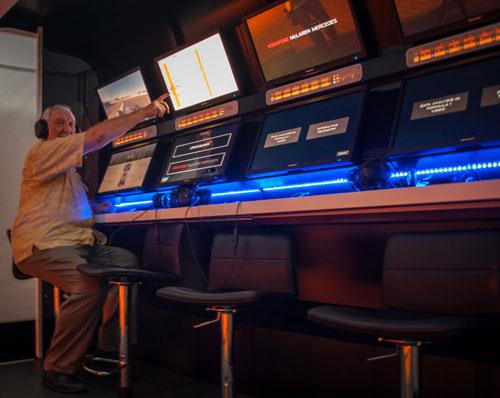Letters from Abu Dhabi: Chapter One: Circuses – F1

Abu Dhabi: There are three kinds of sports; men against distance, men against men, and man-and-machine against man-and machine. Athletics is the first type, rugby and boxing are of the second. Motor Sports and horse racing are of the third. So which does history say is the most popular?
Greece, Rome and Byzantium had all these sporting types. In Rome the Stadium of Domitian, for athletics, held 20,000 spectators, much the same as today. The Colosseum was where Rome’s famed gladiator shows were held; its popularity is attested by a seating capacity of 80,000, big even by today’s standards. But the Circus Maximus, home of chariot racing, dwarfed them all, seating 250,000 spectators, and with a total capacity of 380,000, the biggest sporting venue ever built.
The Circus Maximus could accommodate 25 drivers abreast in their 4HP vehicles. Just imagine the corners. A chariot might be overturned or crushed by rivals as they turned. You would understand the chariot race. Young drivers in crash helmets and body armour with strength skill and courage were celebrities across the Empire, could become multi-millionaires as they moved from team to team, changing livery and allegiances. And they could be killed or maimed in crashes.
Races were preceded by a parade that featured the charioteers, music, costumed dancers, and images of the gods. A commentator told the crowds about the drivers and teams. The race started with the dropping of a flag and the synchronized opening of spring-loaded gates. Does this all sound familiar?
Chariot racing was the foundation event of the Olympic Games, and other Greek events. Team-owners were exceptionally wealthy men or women who enjoyed the limelight. The teams lined-up behind machine-driven starting gates, and as they raced the progress of the battle was indicated by mechanical markers. The most exciting parts of the chariot race were the dangerous and often deadly turns at the ends of the hippodrome. Deliberately running into an opponent to cause a crash was technically illegal, but it was hard for the stewards to prove, and accidents happened anyway.
In the Roman races, bets were large, and owners of multiple teams or syndicate members could abuse the system by having teams or drivers support each other. Spectators would cheat by throwing nail-studded lead “curses” at competitors, and often have fights during a race. And all around was music, noise, food and drinks, pickpockets and prostitutes.
As American Wrestling follows the ancient gladiators with staged fights between outlandishly costumed “goodies” and “baddies”, F1 is the inheritor of the elite chariot racing. It has the same basic structure, thrills, and dangers, in a race between about the same number of drivers in liveried teams. Perhaps history explains why the Tifosi are so ardent in their following of the sport, and the Chinese are so uninspired.
F1 has a regular TV viewership of 50 million; more than any other programme. The 35 biggest capacity stadia in the world are all for motor racing, with the exception of just three: a horse-racing stadium in Japan, a multi-purpose stadium in North Korea, and a football stadium in Calcutta. So it is obvious what thrills crowds today as two millennia ago.
The F1 Circus has blown into town, there is a buzz in the air, and I have already spotted Mark Webber, Nico Rosberg and Lewis Hamilton. I am here at Abu Dhabi to taste smell and hear the excitement first hand and report back to you. I do this out of a sense of duty. With no consideration of my own welfare, I shall push myself to the limit.
I have visited the Fan Zone, offered some advice to McLaren on management of the pit wall, given guidance on changing wheels, tried out the simulators, and pondered strategy.
My seat is at the front of the South Grandstand, at the end of Sector 2 and the second DRS zone, right before turn 11. Look for a slim elegant knowledgeable chap in a nice hat; that would be me.
Tomorrow I inspect the pit lane.
Keep checking our online Phuket Sports pages, join our Facebook fan page or follow us on Twitter @PhuketGazette for the latest local, national and international sporting news and action.
— The Digby
Latest Thailand News
Follow The Thaiger on Google News:


























